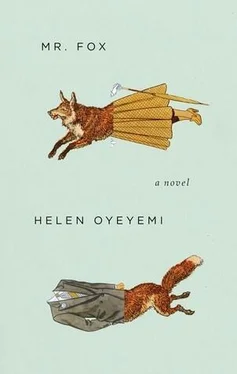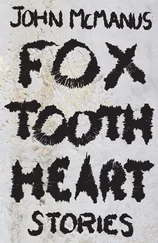His hotel room was cream and burgundy. He drew the blinds and sat down on the chair by the dressing table. I sat on the bed.
“I loved Daphne,” he said. He studied my reaction — I had opened my mouth, but I said nothing. He went on: “I did. But in the last few months she was worse than a child. She lit fires on the carpets and she threw coffee tables through locked windows. She always had to be watched.”
I couldn’t look at his face anymore, so I looked at his long-fingered hands, the way his knuckles jerked as he opened and closed his hand around the room key.
“I see. She was too much trouble—”
“That’s not what I was saying—”
“So you killed her?”
There, it was out.
“Do you always talk like this?” he asked calmly.
“Did you kill her?”
He answered with a smile. The darkest and most malignant I had ever seen, too strong to be voluntary. The door, I thought. The door. But I didn’t dare turn to it, in case it wasn’t there. His smile stayed. It stayed and stayed, until it became meaningless. It calmed me. So light-headed I stopped trying to sit straight. I dropped onto the floor, and he watched me approach, on my knees. I didn’t stop until I was looking directly into his eyes, deep in their hollows. His face tightened — he was barely breathing.
“Oh, you,” I said. “You are a man I’ve been waiting to meet.”
I took his hands. I arranged them around my throat, closed my own hands over them, tight, like a choker. “Did you kill her and get away with it? How did you get away with it?”
“She killed herself.”
I moved so that they pressed together, the two pairs of hands. I let go, then pressed them together again, made my breathing fold like bellows. It felt good. It felt like forgetting.
“Stop it,” he said. But he didn’t move his hands.
“Did you kill her? Did you kill her?”
“I said ‘Stop it.’”
“And me? Do you want to kill me? Is that why you look at me the way you do?”
“What do you want, Mary?”
I offered my lips to be kissed. He didn’t move his head, though he stayed close.
“Kiss me,” I said.
He took a deep, rattling breath. “You’re. . a strange girl.”
“Kiss me.”
He did. My hands worked at the buttons of his shirt, carefully, slowly. He peeled my dress away from my shoulders. Then we were on the floor together. I was pinned beneath him at first. Our open mouths. Our heat. I hooked my legs around his, drank his skin, strange salt that ran like water; my hair swept across his bare chest; I was astride him by then, and I took him an inch at a time (“Wait,” I said, “wait,” pulling away every time he tried to take too much), an aching delay between each movement that brought him deeper. Such pleasure when he finally steadied me above him, his hands where my waist softens into my hips, such pleasure when he filled me.
“I’m sorry I said those things,” I said when we lay together afterwards. His lips brushed my forehead.
“It’s understandable,” he said. “I understand. The lightning. .”
I hated the kindness in his voice — where did it come from? It wasn’t why I wanted him. I wanted the look in his eyes when I’d asked, “Did you kill her?” The moment in which he had hated me.
“You shouldn’t work after-hours,” I said.
He laughed softly. “Then don’t make me.”
He left me sleeping — when I woke I held out my arms to him and there was nothing, not even a note.
Another day passed, and another night, I think. Without him. Then there were a lot of people, and I didn’t know who any of them were. There were so many of them. Why so many? I realised that I was in public. I had to stay there, in public, because I didn’t know how to get home. Every direction looked exactly the same to me.
Someone took my mobile phone. Someone else took my purse. It wasn’t robbery, exactly — I must have just been sitting there, on a park bench after dark, holding out my purse and my phone, my hands like weighing scales, and then they were empty. I didn’t worry about it. I thought it was summer. “It’s summer,” I said to myself. And I saw ants troop past my feet in single file. I wondered about ants. I wondered whether within each ant there is another and another and another until finally you reached a cold small chip of the universe, immovable and displeased.
Then Jonas was there. I don’t know how he found me. We went into McDonald’s, because it was nearest and I was almost frozen. Ha! Not summer after all. I said I wanted onion rings, and he bought me onion rings, which I didn’t eat. No, I tried ring after ring on my heart finger. Wedding rings. None of them fitted, but they didn’t fall apart, either. Jonas watched me, and he rubbed his head all over, as if searching for a thought, then raked hair out of his eyes. His dear face — his thrice-broken nose, his summer eyes. He had bought me onion rings; he wasn’t going to take anything from me. I didn’t really have anything left, anyway, apart from mascara and my door keys. I was happy when he put his arms around me. I hid my face in the lapels of his jacket and my frame loosened, lavalike, beneath my skin. I don’t know how I didn’t scald him. Jonas’s heart beat steadily, not fast, not slow; its order restored me. He drew back.
“Where have you been?” he said. He was Old Testament angry, calm and wild at once, like a prophet come down from the mountains with a storm under his tongue, holding it until it was time.
“When?”
He stared at me, and I said quickly, “I went to a party.”
“Are you sure?”
“Yes. A big one. There were probably photos in the paper. It was at. . oh. . at—”
“The Athenaeum?”
“That’s it.”
“Three nights ago.”
“Three. . really. .?”
“Yes, really.”
“Oh. .”
He counted days off on his fingers, his face stony. “So there was yesterday night. And the night before that. And the night before that. We’ve been trying to reach you.”
“Have you. .”
“Roger died on Friday. They were going to cremate him the day before yesterday, but we’ve asked them to hold on until we could reach you.”
“Reach me? Why?”
“So you can see him,” Jonas said simply. “If you want to stop being afraid, Miel, you’ll do this.” He pulled me up out of my seat. I fought him, but he merely locked his arms around me and contained me. I stomped on his foot and his grip didn’t loosen, but his touch became gentler; he brushed his nose against my cheek: “Sh, sh. .”
“No,” I said. “I can’t.”
“I’ll be there.”
I hoped someone would intervene, but everyone else in the vicinity just stared down into their cartons of fries. They must have thought we were having a lovers’ tiff.
Jonas took my keys and opened the front door, talking on the phone as he did — he was cancelling my credit cards for me, asking me for information. Jonas is a good boy. I don’t deserve him. He unzipped my dress, which had wine all down its front, and dragged the satin down over my waist, my hips — it might have been erotic if he hadn’t been so businesslike. He chose a new dress and pulled it over my head, leaving me to wriggle into it. Jonas isn’t afraid of me. God knows I’ve tried to frighten him in my time, jumping out from behind doors and screaming shrilly, prank-calling him when I knew he was at home alone, bookmarking his favourite psalm with a Tarot card — the hanged man. He’s never been scared of me, so he’ll never run. I’m glad, so glad, of that. I’ve tried to show gratitude. But what can I do for Jonas? Last summer I spent almost an hour blowing dandelions off their stems towards him, so that he had a chance to wish for everything he wanted. He was very polite about it, but it can’t have meant much to him. Jonas thinks about eternity and other things that make wishes seem tiny and silly.
Читать дальше












